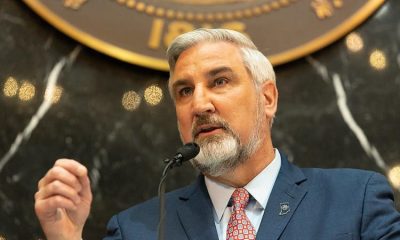Local News
IU researcher creates new ALS therapy

Indianapolis, Indiana – Secretome, a new stem cell-based therapy created by IU researcher Chandler Walker to treat Amyotrophic Lateral Sclerosis, is expected to begin clinical trials this year or next.
ALS is a neurological condition that affects a person’s ability to move and perform physical tasks. According to Walker, ALS assaults the body by resulting in the degeneration of lower motor neurons in the spine and upper motor neurons in the brain.
“When you tell your hand to close, that’s utilizing this upper and lower motor neuron interaction,” Walker said. “In ALS, those specific neurons die, other types of neurons do not, so what you end up with is progressive paralysis and weakness.”
ALS turns out to be really deadly when it targets motor neurons that control breathing, according to Walker. The progression of ALS may be slowed by treatments like secretome. Walker asserted that secretome will prevent the disease’s beginning by safeguarding and rebuilding these motor neurons.
Mesenchymal stem cells release a substance called secretome. Walker stated that preliminary clinical trials and mouse research are in progress. As soon as possible, he wants to start clinical testing.
The president of Neurodegenerative Disease Research Inc., Siobhan Ellison, assisted in securing funds for ALS research. She asserted that there is a significant chance that patients would benefit from Walker’s study soon.
“I think he’s now probably about four or five years out from having a therapy to go into patients,” Ellison said.
It would be impossible to create a precise timeframe for clinical trials because they frequently involve numerous review processes, animal and human studies, and high levels of variability. Ellison underlined the necessity of speed in ALS research, nevertheless. According to Ellison, getting patients treated is the top issue while people deal with its impacts.
Walker’s team’s research analyst Christen Mumaw, laboratory manager at the Indiana University School of Dentistry, emphasized the significance of this therapy if it passes clinical trials.
“If it pans out, it’s going to be life-changing for lots of people,” Mumaw said. “One in 50,000 people are impacted by ALS so it could really make a big difference for those people.”
Mumaw claimed that secretome therapy might be useful for treating Parkinson’s and Alzheimer’s as well as other neurodegenerative conditions.
“Especially with things like Alzheimer’s disease, we all know somebody who is impacted,” Mumaw said. “I think neuroscience and neurodegenerative disorders as a whole are getting a lot more attention now.”
-

 Local News2 weeks ago
Local News2 weeks agoHolcomb is expected to travel to Brazil and Mexico for economic development
-

 Local News2 weeks ago
Local News2 weeks agoIn the United States, Indiana is considered to be one of the least “green” states
-

 Local News2 weeks ago
Local News2 weeks agoFreight railroads have requested that the courts strike down a new regulation mandating two-person crews on trains
-

 Local News2 weeks ago
Local News2 weeks agoCommunities throughout Indiana will get another $500 million in READI awards
-

 Local News2 weeks ago
Local News2 weeks agoAccording to the complaint, I Heart Mac & Cheese broke the Indiana Franchise Act
-

 Local News2 weeks ago
Local News2 weeks agoFunding shortfall forces FCC to cut internet subsidies
-

 Local News1 week ago
Local News1 week ago3 Indiana school districts asking voters for funding in May primary election
-

 Local News1 week ago
Local News1 week agoHendricks Co. Sheriff’s deputy dies after being electrocuted at crash scene






Leave a Reply